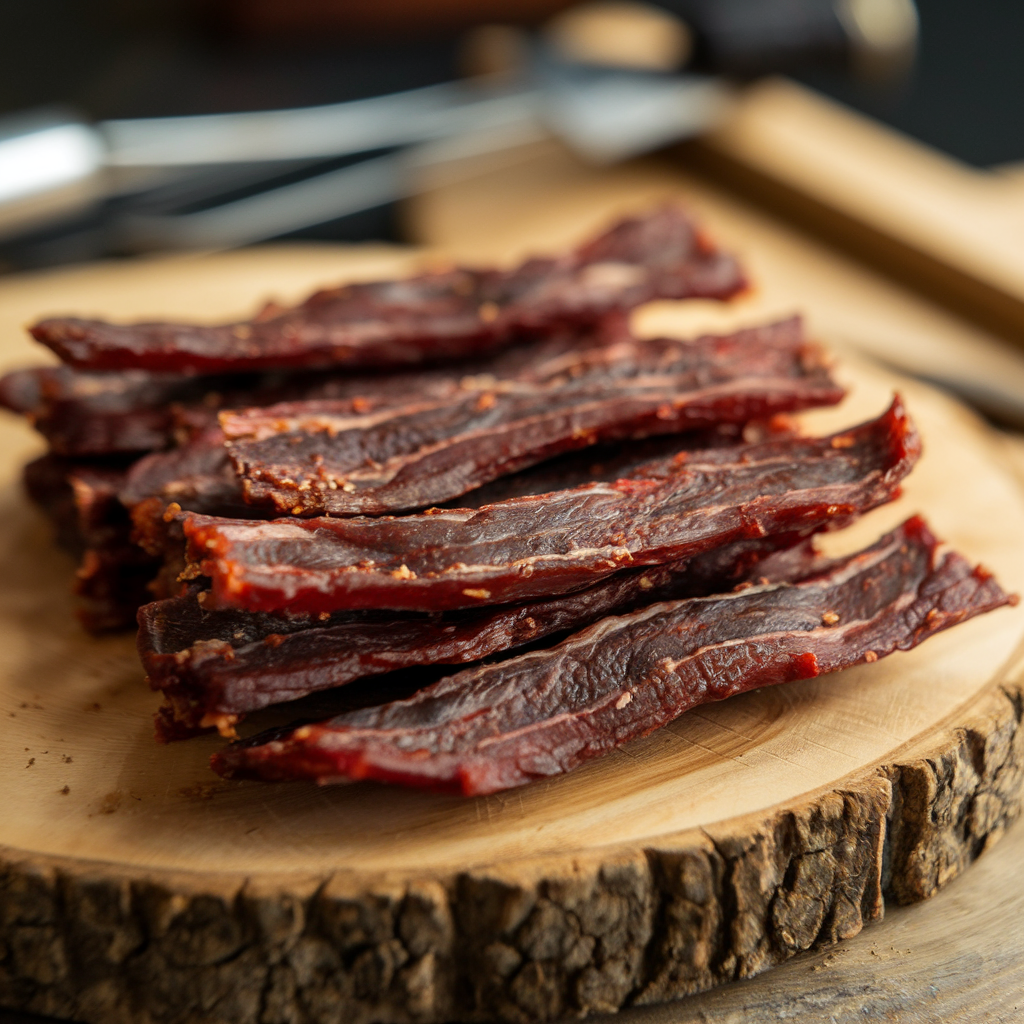Nothing beats homemade smoked beef jerky, that deep, smoky flavor, chewy bite, and bold seasoning made just the way you like it.
Whether you’re firing up a pellet smoker or using a classic wood setup, this recipe gives you that satisfying, protein-packed snack with full flavor in every strip.
Table of contents
Key Ingredients
Essential Ingredients for Smoked Beef Jerky
Creating the perfect smoked beef jerky starts with selecting the right ingredients. The choice of beef cut and marinade components plays a crucial role in the flavor and texture of the final product.
Choosing the Right Cut of Beef
Selecting the right cut of beef is crucial for making high-quality smoked beef jerky. Lean cuts are preferred, as they have less fat, which can cause spoilage. Some of the best cuts for beef jerky include top round, bottom round, sirloin tip, and eye of round. These cuts are lean, affordable, and yield tender jerky when properly prepared.
Want to learn more about the best meat for jerky? Check out our individual beef cuts guide to choose the right one for your recipe.
Marinade Ingredients
A flavorful marinade is key to delicious smoked beef jerky. The basic components of a good marinade include soy sauce, Worcestershire sauce, brown sugar, and liquid smoke. These ingredients provide a balance of salty, sweet, and smoky flavors that enhance the natural taste of the beef.
Basic Marinade Components
The essential components of any beef jerky marinade include:
- Soy Sauce: Adds saltiness and depth of flavor.
- Worcestershire Sauce: Contributes a tangy, savory taste.
- Brown Sugar: Balances the saltiness with a touch of sweetness.
- Liquid Smoke: Provides the characteristic smoky flavor.
Flavor Variations and Add-Ins
To customize your beef jerky, consider adding various spices and flavors:
- Crushed Red Pepper: For a spicy kick.
- Garlic Powder: For an extra layer of flavor.
- Onion Powder: Adds a subtle sweetness.
- Teriyaki Sauce: For a sweet and savory profile.
- Honey: Adds natural sweetness and aids in caramelization.
Preparation and Smoking Methods
How to Prepare Beef for Smoking
– Trimming and Slicing the Beef
Preparing the beef properly is essential for the perfect jerky. Trim any excess fat from the beef, as fat does not dehydrate well and can spoil. Slice the beef against the grain into thin, uniform strips, about 1/4 inch thick. Uniform thickness ensures even drying.
– Techniques for Slicing
Using a sharp knife or a meat slicer can help achieve even slices. For easier slicing, partially freeze the beef for about 1-2 hours before cutting. This firm texture helps in making precise, thin cuts.
– Ensuring Uniform Thickness
Uniform thickness is key to consistent drying. Slices that are too thick may not dry properly, while too thin slices can become brittle. Aim for uniformity to ensure all pieces dry evenly.
Marinating the Beef

– Importance of Marinating
Marinating the beef not only enhances its flavor but also helps to tenderize it. A good marinade can penetrate the meat, infusing it with a rich, savory taste that makes your jerky delicious.
– Best Marinades for Beef Jerky
Prepare your marinade using a mix of soy sauce, Worcestershire sauce, brown sugar, and liquid smoke. You can also experiment with additional ingredients like garlic, onion powder, and various spices to create your own unique flavor profile.
Smoking Techniques
Best Methods for Smoking Beef Jerky
– Equipment Needed
To smoke beef jerky, you’ll need a smoker, but there are alternative methods if you don’t have one. An electric smoker, charcoal smoker, or even a regular grill can work well. Ensure you have wood chips like hickory, mesquite, or applewood for a smoky flavor.
– Types of Smokers
There are several types of smokers you can use to make beef jerky:
- Electric Smokers: Easy to control temperature and smoke levels.
- Charcoal Smokers: Provide a classic smoky flavor but require more attention.
- Pellet Smokers: Use wood pellets for consistent smoke and heat.
- Gas Smokers: Convenient and easy to use, with good temperature control.
– Alternatives to Smokers
If you don’t have a smoker, you can still make beef jerky using a regular grill or an oven. For a grill, set up indirect heat and use wood chips for smoke. For an oven, set it to the lowest temperature and use a foil-lined baking sheet with a rack.
Smoking Process
– Preparing the Smoker
Prepare your smoker by setting it to a low temperature of around 160-180°F. Soak wood chips in water for 30 minutes before adding them to the smoker. This helps create a steady flow of smoke.
– Smoking Temperature and Time
Place the marinated beef strips on the smoker racks, ensuring they don’t overlap. Smoke the jerky for 4-6 hours, or until it reaches your desired level of dryness and chewiness. Maintain a consistent temperature throughout the smoking process to ensure even drying.
– Post-Smoking Steps
After smoking, let the jerky cool completely before storing. This helps prevent moisture buildup, which can lead to spoilage.
Cooling and Storing Jerky
Once the jerky has cooled, store it in an airtight container or vacuum-sealed bags. Properly stored jerky can last up to two weeks at room temperature or longer in the refrigerator. For extended shelf life, freeze the jerky.
If you’re interested in preserving other beef-based preparations, see how to freeze beef stock properly to extend its shelf life
Ensuring Food Safety
Always handle raw meat with care to avoid cross-contamination. Keep the work area clean and wash hands and utensils thoroughly. Ensuring that the jerky reaches an internal temperature of 160°F during smoking helps kill any harmful bacteria.
Recipes
Delicious Smoked Beef Jerky Recipes
– Classic Smoked Beef Jerky
Ingredients:
- 2 pounds of beef (top round, bottom round, sirloin tip, or eye of round)
- 1/2 cup soy sauce
- 1/2 cup Worcestershire sauce
- 1/4 cup brown sugar
- 1 teaspoon liquid smoke
- 1 teaspoon black pepper
Preparation Steps:
- Trim any excess fat from the beef and slice it against the grain into 1/4 inch thick strips.
- Combine soy sauce, Worcestershire sauce, brown sugar, liquid smoke, and black pepper in a bowl to create the marinade.
- Add the beef strips to the marinade, ensuring they are fully submerged. Marinate in the refrigerator for at least 4 hours, or overnight for best results.
Smoking Instructions:
- Prepare the smoker and set it to 160-180°F.
- Place the marinated beef strips on the smoker racks, ensuring they don’t overlap.
- Smoke for 4-6 hours until the jerky reaches the desired level of dryness and chewiness.
- Allow the jerky to cool completely before storing it in an airtight container.
– Spicy Smoked Beef Jerky
Ingredients:
- 2 pounds of beef (top round, bottom round, sirloin tip, or eye of round)
- 1/2 cup soy sauce
- 1/2 cup Worcestershire sauce
- 1/4 cup brown sugar
- 1 teaspoon liquid smoke
- 1 teaspoon crushed red pepper
- 1 teaspoon black pepper
Preparation Steps:
- Trim any excess fat from the beef and slice it against the grain into 1/4 inch thick strips.
- Combine soy sauce, Worcestershire sauce, brown sugar, liquid smoke, crushed red pepper, and black pepper in a bowl to create the marinade.
- Add the beef strips to the marinade, ensuring they are fully submerged. Marinate in the refrigerator for at least 4 hours, or overnight for best results.
Smoking Instructions:
- Prepare the smoker and set it to 160-180°F.
- Place the marinated beef strips on the smoker racks, ensuring they don’t overlap.
- Smoke for 4-6 hours until the jerky reaches the desired level of dryness and chewiness.
- Allow the jerky to cool completely before storing it in an airtight container.
– Teriyaki Smoked Beef Jerky
Ingredients:
- 2 pounds of beef (top round, bottom round, sirloin tip, or eye of round)
- 1/2 cup soy sauce
- 1/2 cup Worcestershire sauce
- 1/4 cup brown sugar
- 1 teaspoon liquid smoke
- 1/4 cup teriyaki sauce
Preparation Steps:
- Trim any excess fat from the beef and slice it against the grain into 1/4 inch thick strips.
- Combine soy sauce, Worcestershire sauce, brown sugar, liquid smoke, and teriyaki sauce in a bowl to create the marinade.
- Add the beef strips to the marinade, ensuring they are fully submerged. Marinate in the refrigerator for at least 4 hours, or overnight for best results.
Smoking Instructions:
- Prepare the smoker and set it to 160-180°F.
- Place the marinated beef strips on the smoker racks, ensuring they don’t overlap.
- Smoke for 4-6 hours until the jerky reaches the desired level of dryness and chewiness.
- Allow the jerky to cool completely before storing it in an airtight container.
– Honey Garlic Smoked Beef Jerky
Ingredients:
- 2 pounds of beef (top round, bottom round, sirloin tip, or eye of round)
- 1/2 cup soy sauce
- 1/2 cup Worcestershire sauce
- 1/4 cup brown sugar
- 1 teaspoon liquid smoke
- 1/4 cup honey
- 1 teaspoon garlic powder
Preparation Steps:
- Trim any excess fat from the beef and slice it against the grain into 1/4 inch thick strips.
- Combine soy sauce, Worcestershire sauce, brown sugar, liquid smoke, honey, and garlic powder in a bowl to create the marinade.
- Add the beef strips to the marinade, ensuring they are fully submerged. Marinate in the refrigerator for at least 4 hours, or overnight for best results.
Smoking Instructions:
- Prepare the smoker and set it to 160-180°F.
- Place the marinated beef strips on the smoker racks, ensuring they don’t overlap.
- Smoke for 4-6 hours until the jerky reaches the desired level of dryness and chewiness.
- Allow the jerky to cool completely before storing it in an airtight container.
Looking for a hearty comfort dish after your jerky adventure? Try our chicken and dressing recipe, a Southern classic.
Frequently Asked Questions
What’s the best cut of beef for smoked jerky?
Top round, bottom round, or flank steak are ideal, they’re lean, easy to slice thin, and perfect for jerky texture.
How long does smoked jerky last?
When stored in an airtight container, it lasts up to 1 week at room temp, 2–3 weeks in the fridge, or up to 3 months in the freezer.
Should I marinate the beef before smoking?
Yes, marinate for at least 6–12 hours for full flavor absorption. Classic ingredients include soy sauce, Worcestershire, garlic, and brown sugar.
At what temperature should I smoke beef jerky?
Smoke low and slow, ideally between 160°F and 180°F – for 4 to 6 hours, depending on thickness and texture preference.

